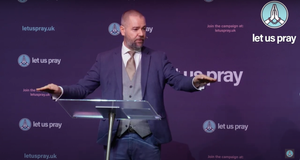Waking up to God
Jehoshaphat, the godly king of Judah, was suffering thirst – along with the kings of Israel and Edom. Their armies, bent on punishing Moab for rebelling against Israel, had marched for seven days through the wilderness of Edom without finding water to sustain them (2 Kings 3:1-9).
But this was Israel’s quarrel, not Judah’s. How, then, had Jehoshaphat become entangled with his ungodly neighbours in this ill-fated venture? Because it seems that at that stage he ‘did not ask counsel of the Lord’ (compare Joshua 9:14).
When the king of Israel solicited Jehoshaphat’s support, the latter made his decision on political grounds – to foster good relations with the northern kingdom. Ignoring the inconvenient fact of Israel’s apostasy, Jehoshaphat appealed to familial ties to justify joining Jehoram’s crusade (2 Kings 3:7).
Compartmental thinking
We easily make the same mistake as Jehoshaphat – the mistake of compartmental thinking. The king of Judah had greatly promoted godliness in his own land, but when it came to an external political decision, he simply left God on one side. In this area, it was not obedience to the Lord, but family ties and political objectives that determined his actions.
Too many genuine Christians compartmentalise their lives in this manner. There is one compartment for God and his Word, another for family relationships, another for education and career, another for finance, and so on.
This becomes apparent when, in these different areas of life, believers put self-interest or family preoccupations before their obedience to Scripture and commitment to their spiritual family, the local church. One pastor remarked recently that ‘blood is thicker than grace’. He had a point.
In this and similar matters, few Christians today are willing to ‘bring every thought into captivity to the obedience of Christ’ – the objective for which Paul strove as he ministered to the churches (2 Corinthians 10:4-6).
Waking up
Ironically, it was the godless Jehoram who alerted Jehoshaphat to his errors. ‘Alas’, he cried, ‘for the Lord has called these three kings together to deliver them into the hand of Moab!’ (v.10). We can imagine a startled Jehoshaphat thinking: ‘What’s that? Might our predicament have something to do with the providence of God?’
Shaken into awareness that – whatever enterprise we undertake – we ‘live and move and have our being’ in God, Jehoshaphat at last seeks divine assistance: ‘Is there no prophet of the Lord here that we may enquire of the Lord by him?’ (v.11).
So the Lord may use various means and circumstances to awaken us to the fact that he is sovereign over all. He is not a dumb idol to be polished and displayed in public worship once or twice a week. He is the living God who orders all things according to the counsel of his will (Ephesians 1:11). He cannot be imprisoned in the box-room of our lives.
God our saviour
At this point, Jehoshaphat had no idea that Elisha was with them in the wilderness. Indeed, he had to be told who Elisha was (v.11). So when we ‘wake up to God’ our first enquiry takes our Spirit-stirred souls to Scripture generally. We will have a new hunger for God’s Word – to read it, to hear it preached, to meditate upon it and, yes, to obey it.
But just as Jehoshaphat’s need quickly led him to Elisha (vv. 11-14), so also will the Scripture lead us to Christ. ‘Elisha’ means ‘God is saviour’ and both his name and his exploits picture the Christ who saves us from the wilderness of sin and disobedience – who became for us wisdom from God, and righteousness and sanctification and redemption’ (1 Corinthians 1:30).
Jehoshaphat was already a believer, but his fateful encounter with Elisha began a new chapter in his life. His thirst was quenched, his company saved, his cause delivered from disaster, and victory over Moab assured.
Will this not also be true of us if we ‘let God loose’ into every part of our lives? If we come to understand what full surrender to his ‘perfect will’ really involves? If we ‘present [our] bodies a living sacrifice, holy and acceptable to God, which is [our] reasonable service’ (Romans 12:1-2)?



















